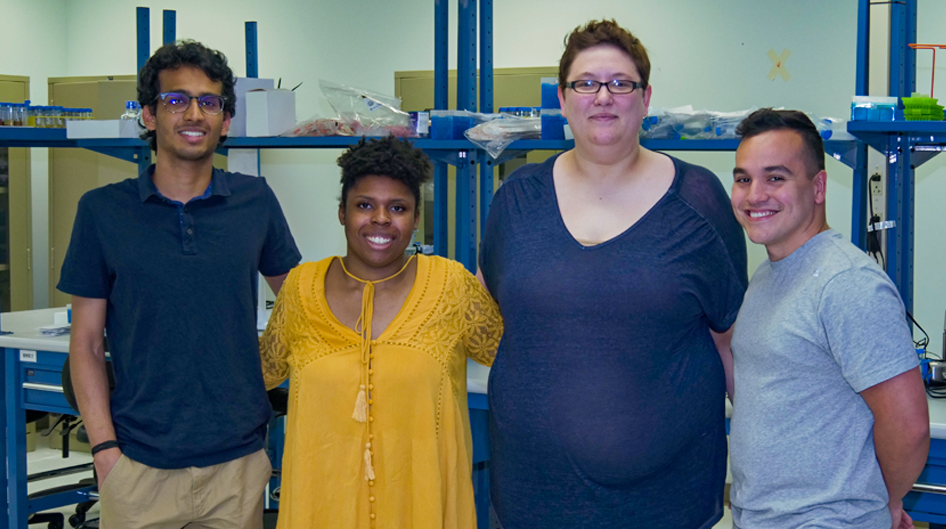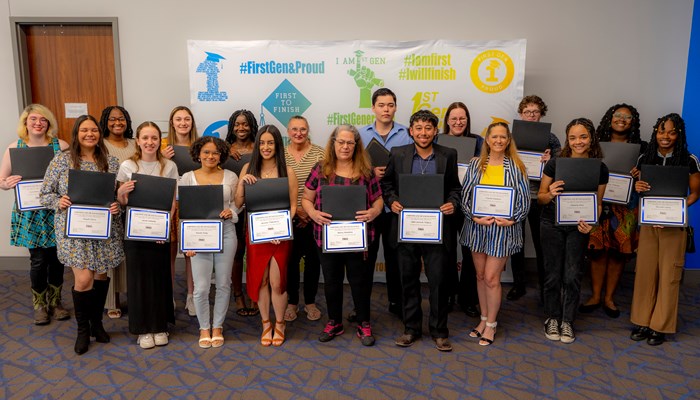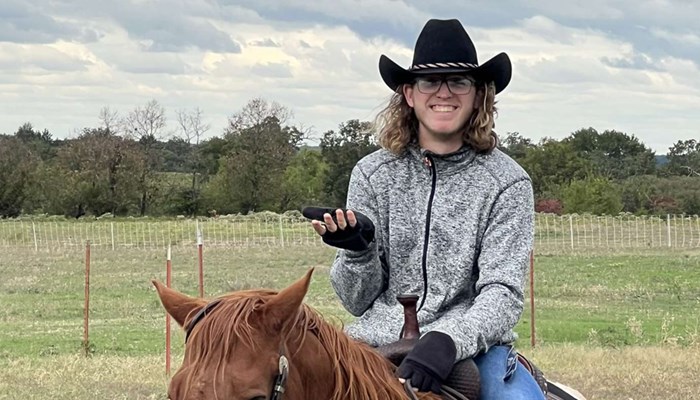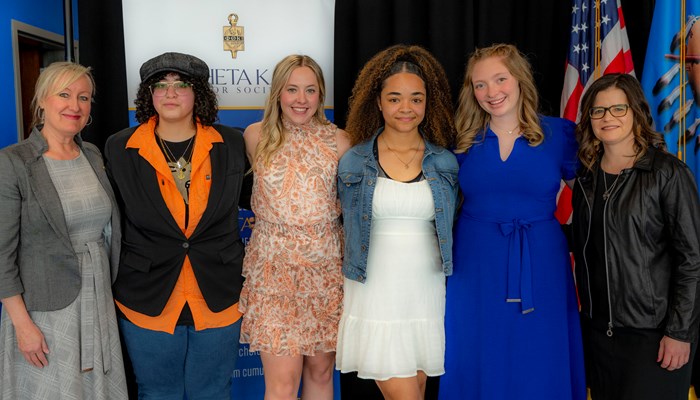Rose State Teams Up With NASA to Study Space Travel Published September 6, 2019
 Have dreams of traveling to Mars one day? A few former and current Rose State College students are working to turn that dream into a reality.
Have dreams of traveling to Mars one day? A few former and current Rose State College students are working to turn that dream into a reality.
Over the last four years, nine Rose State students have participated in the Langston University NASA Advanced Research (LUNAR) program, a summer internship designed to allow college-level students interested in science, technology, engineering, and mathematics (STEM) careers to conduct research for the human exploration of space.
“The program itself was established approximately five years ago when NASA sponsored a $4.9 million grant to the Science Research Institute located at Langston University to assist with the Mission to Mars,” says Brooklynn Baker, a current student at Langston University and former Rose State Raider. Baker participated in the LUNAR internship the summer of 2018.
The grant established the Langston University NASA Advanced Research in Biology Center, one of the locations where the internship and research take place. Over the course of the summer, students contribute to research and technology development priorities of the Human Exploration and Operations Mission Directorate (HEOMD). The HEOMD manages the International Space Station and works further our capabilities to extend human presence throughout the solar system.
Langston University NASA Advanced Research Program
Langston University partners with Harvard Medical School, Stanford University School of Medicine, the University of North Texas Health Science Center, and Rose State College to encourage undergraduate students to earn STEM and research-related degrees.
The Rose State Engineering and Science Division encourages students each year to participate in the program and pursue research in higher education. As part of the program, students enroll in a course and conduct research on the Langston University campus, and receive a $7,300 stipend, room and board for eight weeks, and a trip to the Johnson Space Center in Houston, Texas.
When Brooklynn was first introduced to the LUNAR program by her professors at Rose State, she wasn’t sure she’d be a good fit. She was a pre-medicine and Spanish major and didn’t see how research could intertwine with her desired career path.
“It’s quite funny, I originally wasn’t going to apply due to the program advertising for students interested in the field of research,” she says. “However, Dr. Corey Rubel, Dr. Amy Hurst, and Dr. Leanne May informed me that students from all backgrounds were welcomed to apply. With that new information, I decided to take a leap of faith and apply for the program. It was honestly the best decision I have ever committed to.”
Preparing for NASA
Johann Kurien is a current Rose State engineering student who participated in the NASA internship program this summer.
“I learned of the program through a flyer I saw at Rose State,” he says. “The classes I took at Rose were mostly engineering classes which prepared me for tackling complicated challenges. The most exciting facet was the association with NASA which piqued my interest immediately.”
Baker also echoes the classes she took during her time at Rose State tremendously helped her succeed in the LUNAR program.
“My professors structured their courses in a manner that allowed me to develop the proper reading, writing, and critical thinking skills to be successful in the NASA summer program,” she says. “The good habits that I developed and/or strengthened while participating in their classes have carried over to additional internships, thus making those new experiences more enjoyable and less stressful.”
Conducting Research to Send Humans to Mars
Throughout her internship, Baker’s project centered on helping astronauts during long-duration space flight missions.
“When starting the project, I was informed that astronauts who are sent on long-duration space flight missions will develop a weaker immune system,” she says. “This is quite detrimental because certain latent herpes viruses like EBV (Epstein–Barr virus) or VZV (Varicella-zoster virus) are reactivating, thus causing the astronauts to become ill while in space.”
Baker worked with various medicinal plant extracts to discover a national countermeasure against immune system dysregulation under simulated microgravity conditions. Essentially, she sought out substances that would help keep astronauts healthy and their immune systems strong while in space.
Kurien, on the other hand, worked on a different kind of research during his time in the program this summer.
“The research I was looking into involved manipulating heat transfer for a payload that would be sent up into microgravity conditions,” he says.
Anything sent up into space at high velocity is subject to immense heat. Kurien’s research will help to cool down systems and equipment so that we can send humans farther in space than we ever have before.
Overall, Kurien was excited to work on research that correlates with NASA’s future mission goals to send humans to space for short-term and long-term durations. He’s also appreciative of the research skills he’s gained through the program that he can apply to his classes and future career.
“I’ve learned that research involving space is very multidisciplinary,” he says. “One has to be able to work with and understand all the components of the mission to be successful.”
Even though the research conducted through the LUNAR program is designed to benefit space travel, Baker is confident their findings could have wider ramifications.
“Even though I am participating in a project that is designated to benefit astronauts in space, there are applications of my research that possess societal benefits,” she says. “For instance, the medicinal plant extracts analyzed for immune-stimulatory effects may be applicable to providing very low-cost treatment of immune-related diseases here on earth. This would be of huge impact to the economy as there is a growing concern of rising health costs.”
Brooklynn and Johann’s Post Internship Plans
Both Baker and Kurien are grateful for the experiences they were given as part of the LUNAR program. They plan to take the skills they’ve gained and apply them toward furthering their degrees.
“Being able to participate in a project larger than myself and possible generation is quite honoring, exciting, and humbling,” Baker says. “I also appreciated NASA’s interest in accepting students from community colleges. The NASA program really offered me the opportunity to showcase my abilities in a manner that was beneficial to many people.”
After earning her bachelor’s degree in biology from Langston University, Baker plans to attend the University of Central Oklahoma to earn a second bachelor’s degree in Spanish.
“Eventually, I plan on applying and attending medical school,” she says. “My life goal is to participate in medical missions, particularly missions stationed in Mexico.”
For Kurien, after finishing his associate degree at Rose State, he plans to obtain his bachelor’s in engineering and possibly pursue graduate school later down the road.
Interested in Pursuing Research for NASA
The LUNAR program is open to all Rose State students, regardless of major. Although the program itself focuses on conducting research in the field of biological sciences, both Kurien and Baker are prime examples that research skills are applicable to any future career path.
The Rose State Engineering and Science Division opens the application for the LUNAR program each year in January with a deadline to apply in mid-March, and the internship runs from the end of May through the first week of August. If you’re interested in learning more about the program, you can contact Dr. Ahedor (aahedor@rose.edu), Dr. Jones (wzjones@rose.edu), or Jamie Fowler (jfolwer@rose.edu).
“This program has provided numerous opportunities that have exceeded my wildest dreams. I’ve learned so much, and I have the program to thank for that,” Baker says. “Any student that has a passion to learn and a drive to be successful in their selected careers should consider applying to the program. Everyone is welcome and I full-heartedly support and recommend this program to Rose State students.”



